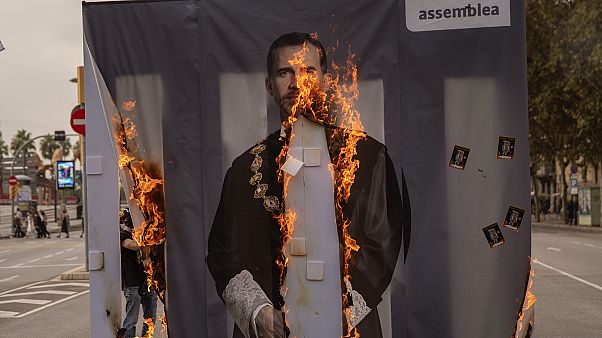By Euronews with AP • last updated: 09/10/2020

Activists of Catalonia's pro-independence grassroots group, ANC, burn a portrait of Spain's King Felipe VI during a demonstration in Barcelona on Friday, October 9, 2020. - Copyright Emilio Morenatti/Associated Press
Several thousand Catalan
Several thousand Catalan separatists protested the visit of Spanish King Felipe VI and Prime Minister Pedro Sánchez to Barcelona amid continued tensions between the restive region and national authorities.
Crowds gathered as activists of the pro-independence grassroots group Catalan National Assembly (ANC) set fire to a portrait of the Spanish monarch during a demonstration in the centre of the city.
Police set up roadblocks and heavily patrolled the streets around the train station where the king and prime minister attended the Barcelona New Economy Week innovation awards on Friday.
Representatives of the Catalan government and the city's mayor Ada Colau did not attend.
The visit by Spain’s heads of state and government comes less than two weeks after Catalonia’s regional chief, Quim Torra, was removed from office by Spain’s Supreme Court.
The court ruled him unfit to hold office for having violated election laws when he refused to remove a banner from public buildings supporting imprisoned Catalan separatists during an official election campaign.
As well as a €30,000 fine, the panel of judges on the court upheld a one-and-a-half-year ban on Torra holding public office imposed by a Barcelona court in December 2019.
Some small groups of protesters gathered to burn photos of the king on Thursday night, chanting "Catalonia has no king."
But there were no reported major clashes with police like the ones that occurred when Sánchez held a Cabinet meeting in Barcelona in December 2018.
Effigies of the king were burned in a show of defiance on Catalonia's National Day - known as La Diada - on September 11, just weeks before the Supreme Court's ruling on Torra's case.
Over 50,000 protesters turned out for the annual celebrations which usually attracts large numbers but were muted by the region's response to the coronavirus pandemic.
Catalonia’s separatist movement, which is supported by roughly half the 7.5 million residents in the region, wants to create a republic in the wealthy northeast corner of Spain.
The region's political system is in paralysis in the wake of Torra's ban. Snap elections have been tentatively pencilled in for February 14, 2021, if regional lawmakers can't elect a candidate to replace the ousted president.
The competing pro-independence parties in Catalonia’s ruling coalition are refusing to put forward a joint candidate to replace Torra as a way to protest their leader’s removal, while parties opposing secession lack a majority to elect a successor.
No comments:
Post a Comment